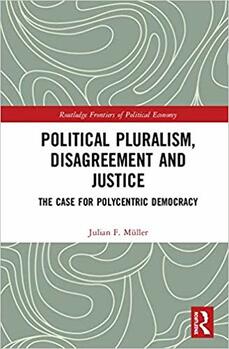
Political Pluralism, Disagreement and Justice: The Case for Polycentric Democracy
How can we organize society in such a way that our disagreement about facts and norms works to the benefit of everyone? In response, it makes the argument for polycentric democracy, a political arrangement consisting of various political units that enjoy different degrees of independence.It is argued that to progress towards justice, we first need to change our attitude towards reasonable disagreement. Theorists have always viewed reasonable disagreement as nuisance, if not as a threat. However, this work puts forward that the diversity of perspectives which underlie reasonable disagreement, should be viewed as a resource to be harvested rather than a threat to be tamed. Resting on two key arguments, the author proposes the idea of polycentric democracy as the most capable method of making pluralism productive. The book explores what such a political order might look like and concludes that only an institutional system which is capable of profiting from diversity, such as polycentric democracy, might reasonably be expected to generate an overlapping consensus.
This book lies at the intersection of philosophy, political economy and political theory. It will be of great interest to academics and scholars working in philosophy, politics and economics.
Some Endorsements:
How can we organize society in such a way that our disagreement about facts and norms works to the benefit of everyone? In response, it makes the argument for polycentric democracy, a political arrangement consisting of various political units that enjoy different degrees of independence.It is argued that to progress towards justice, we first need to change our attitude towards reasonable disagreement. Theorists have always viewed reasonable disagreement as nuisance, if not as a threat. However, this work puts forward that the diversity of perspectives which underlie reasonable disagreement, should be viewed as a resource to be harvested rather than a threat to be tamed. Resting on two key arguments, the author proposes the idea of polycentric democracy as the most capable method of making pluralism productive. The book explores what such a political order might look like and concludes that only an institutional system which is capable of profiting from diversity, such as polycentric democracy, might reasonably be expected to generate an overlapping consensus.
This book lies at the intersection of philosophy, political economy and political theory. It will be of great interest to academics and scholars working in philosophy, politics and economics.
Some Endorsements:
- "Political Pluralism, Disagreement and Justice is a powerful and original defense of a polycentric political order. And it is an important contribution to a fresh approach to political philosophy, “New Diversity Theory,” according to which moral diversity is not moral reasoning gone awry, or a feature of free societies to be managed, but a fundamental moral phenomenon that can be a resource to discover better ways of living together. This book shows Julian Müller to be one of the young, innovative, thinkers who may well change the face of political philosophy." Gerald Gaus, James E. Rogers Professor of Philosophy, University of Arizona, USA
- “Julian Mueller’s book is not only one of the best introductions and accounts of the increasingly influential literature on polycentric governance systems but also it is an important contribution to it, advancing in significant ways the frontier of our understanding of polycentric democracy in both the analytical-explanatory and the normative-applied directions.” Paul Dragos Aligica, George Mason University, USA